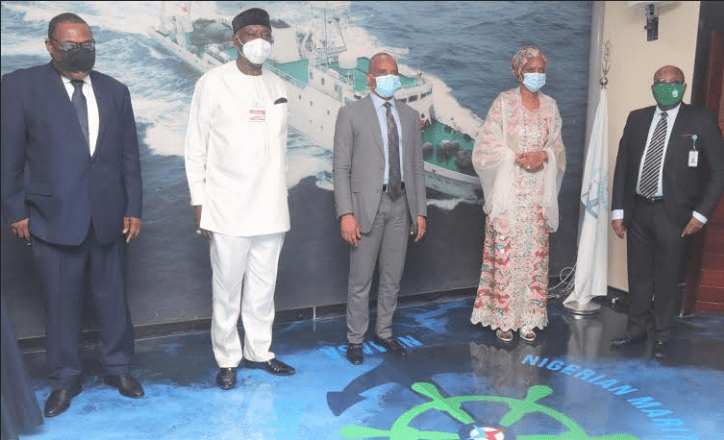
Director General of the Nigerian Maritime Administration and Safety Agency (NIMASA), Bashir Jamoh, has assured that the agency’s Deep Blue project, which aims to tackle insecurity on Nigeria’s territorial waters, would become operational by October 2020.
Jamoh disclosed this while briefing journalists at the end of a closed-door meeting of heads of maritime agencies at NIMASA headquarters in Apapa on Tuesday.
He said more than 85 percent of the assets of the Deep Blue project are already in the country, noting that what is left is the local component which includes logistics and training.
Jamoh said the restrictions placed on international travels as part of measures to curb the spread of COVID-19 made it impossible for the agency to send its personnel that would be part of those to man the platform to foreign countries for the requisite training.
“Due to the COVID-19 pandemic, we have not been able to send personnel abroad to go for training for the Deep Blue project. Most of the Deep Blue assets are highly sophisticated equipment tailor-made for the Nigerian terrain. That is why it is only the manufacturers of these assets that can deliver the required training for those that will man these assets.
“We have agreed to send personnel for this training by this month so that the Deep Blue project can commence operation by September or October of this year,” he said.
On other issues discussed at the meeting, Jamoh said, “We have agreed to set up a committee that will look into the operation of the port community system. We also discussed the 24 hours operation of our ports. We observed that port efficiency and effectiveness cannot be achieved without 24 hours port operation.
“We have also agreed that at the next meeting, we will have an action plan which will come with deliverables and key performance indicators to see how our ports will run on a 24-hour basis. The issue of multi-modal means of cargo evacuation was also discussed, and the National Inland Waterways Authority (NIWA) has been mandated to ensure professionalism in movement of cargoes by barges.
“We also agreed to co-opt the Nigerian Railway Corporation (NRC) into this meeting because rail evacuation of cargoes is very important for efficient port operation. So far, we are focusing on road, inland waterways and the rail means of cargo evacuation at our ports.”
On his part, Executive secretary of NSC, Hassan Bello, said that the Council is working towards abolishing payment of container deposits to shipping companies by importers before the end of first quarter of next year.
Bello said shippers pay N1.7 billion every year on containers deposit, which adds to the cost of doing business in the country.
Bello, who blamed lack of holding bays and the gridlock at the port premises as reasons why some of the containers are not returned on time, said the Council is already in talk with the National Insurance Corporation of Nigeria to see how they can get insurance for the shippers to cover the cost of containers.
The Managing Director of Nigerian Ports Authority (NPA), Hadiza Bala Usman, stressed that no port system can be efficient without a multimodal transport system, noting that the traffic gridlock that characterizes Nigerian port access roads would continue until there are sufficient linkages with railways, inland waterways to complement the road mode.
She also urged the Nigeria Customs Service on the need to fast track the process of auctioning overtime cargoes at the ports.